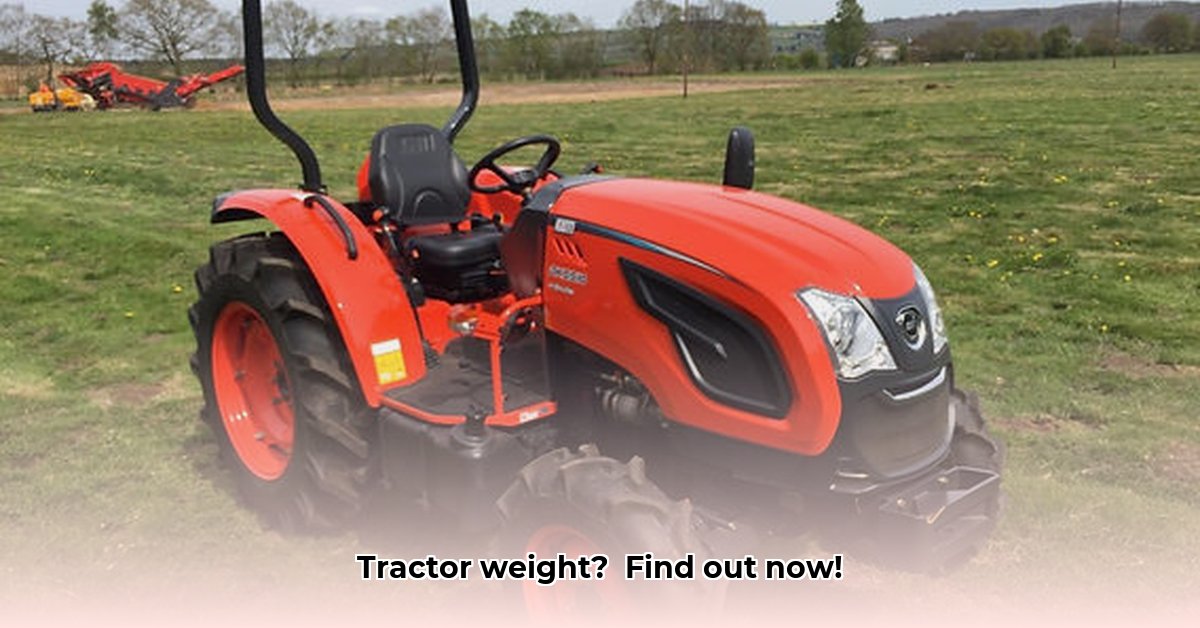
How Much Does a Tractor Weigh? The Importance of Weight in Sustainable Agriculture
The weight of a tractor isn't just a number; it's a crucial factor influencing the sustainability and profitability of your farming operation. While the answer to "How much does a tractor weigh?" varies greatly, understanding this weight's impact on soil health, fuel consumption, and the environment is essential for responsible agricultural practices. This guide explores tractor weight categories, the environmental consequences of excessive weight, and strategies for minimizing negative impacts. For more information on tire weight, check out this helpful resource: Tire Weight Info.
Tractor Weight Ranges and Categories
Tractor weights span a vast range, from compact models suitable for small-scale operations to heavy-duty machines designed for large-scale farming. The appropriate weight depends on several key factors discussed later.
| Tractor Type | Approximate Weight Range (lbs) | Typical Uses |
|---|---|---|
| Compact | 1,000 - 4,000 | Small gardens, vineyards, landscaping, maintenance |
| Utility | 4,000 - 10,000 | Diverse tasks on medium-sized farms; haying, planting |
| Heavy-Duty | 10,000+ | Large-scale farming; plowing, heavy tillage |
Impact of Tractor Weight on Sustainability
Heavier tractors, while offering increased power and traction, significantly impact soil health and fuel efficiency. Soil compaction, a direct consequence of excessive weight, reduces water infiltration, hinders root growth, and diminishes crop yields. Furthermore, heavier tractors consume more fuel, increasing operational costs and greenhouse gas emissions.
What are the long-term environmental implications of using heavy tractors? This is a crucial question for farmers prioritizing sustainability.
Choosing the Right Tractor: A Practical Guide
Selecting the right tractor necessitates careful consideration of your farm's specific needs.
Farm Size: Smaller farms often benefit from lighter tractors, minimizing soil compaction and fuel consumption. Larger operations might require heavier machines, but adopting best practices can mitigate negative environmental effects.
Soil Type: Lighter tractors are preferable for heavy clay soils susceptible to compaction. Sandy soils are more tolerant of heavier machinery.
Operational Needs: Evaluate the tasks you'll perform. Light tasks, such as spraying or mowing, might only require a compact tractor, whereas heavy tillage demands a more powerful, and heavier, machine.
Mitigation Strategies: Minimizing Negative Impacts
Even with heavier tractors, several strategies can reduce their environmental footprint.
Low-Pressure Tires: These distribute weight across a larger area, minimizing soil compaction.
Precision Farming: GPS-guided tractors and variable-rate application optimize resource usage, reducing fuel consumption and environmental impact.
No-Till Farming: This approach avoids plowing, preserving soil structure and minimizing compaction.
Future Trends in Sustainable Tractor Technology
The agricultural machinery sector is actively pursuing sustainable solutions. We can expect advancements in:
- Alternative Fuels: Electric and hydrogen-powered tractors are emerging as viable options.
- Lighter Materials: Innovations in materials science are leading to lighter yet durable tractor designs.
- Enhanced Precision Farming: Further technological advancements will significantly improve resource efficiency.
Conclusion: Weight Matters in Sustainable Agriculture
The weight of your tractor is not merely a technical specification; it's a critical decision impacting the long-term health and productivity of your farm. Careful selection, coupled with sustainable farming practices, ensures both environmental responsibility and economic viability. Prioritizing lighter tractors where possible, coupled with the adoption of mitigation strategies, yields a more sustainable future for agriculture.
Key Takeaways:
- Tractor weight significantly affects soil health, fuel efficiency, and environmental impact.
- Lighter tractors generally reduce compaction and fuel consumption, but might lack the power needed for large-scale operations.
- Consider your farm size, soil type, and operations when selecting your tractor.
- Utilize mitigation strategies like low-pressure tires, precision farming, and no-till practices.
- Stay informed about emerging sustainable tractor technologies and policies.